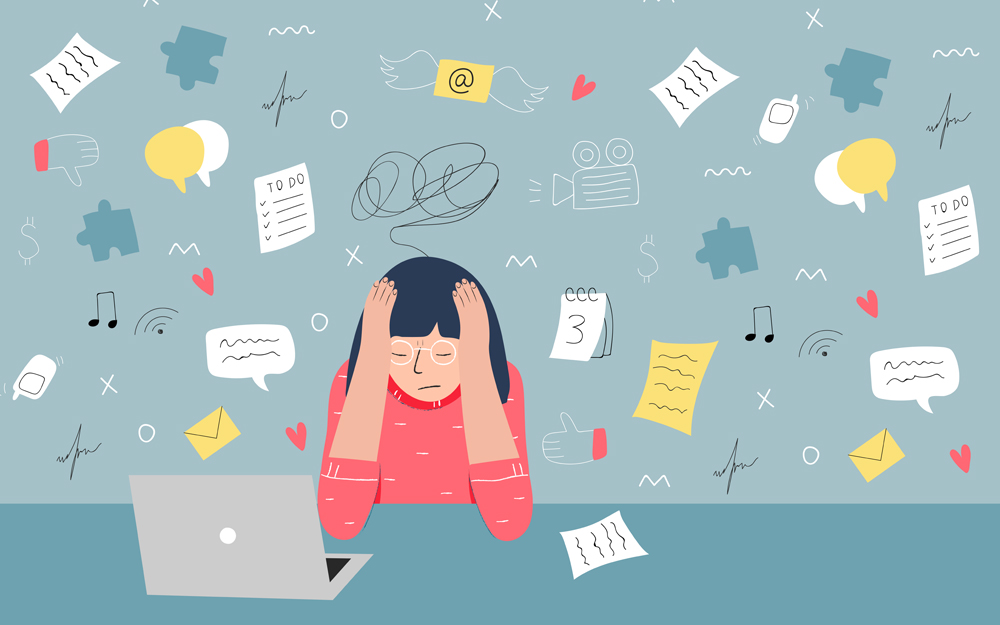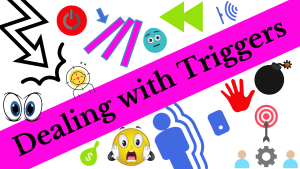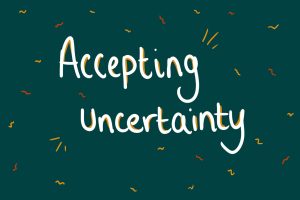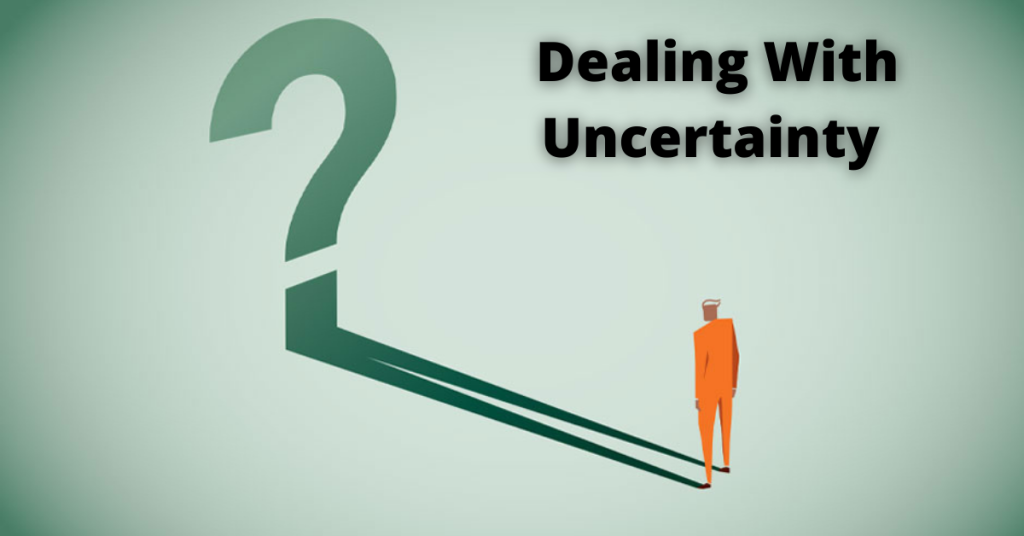Life is full of uncertainties. We don’t know what the future holds, and this can be unsettling for many people. Dealing with uncertainty can be difficult, but there are strategies that you can use to cope with life’s unknowns. In this blog post, we will discuss some of the best ways to deal with uncertainty. We will also provide tips for managing your anxiety and staying positive in the face of uncertainty.
Contents
What Are Uncertainties?
 Uncertainties are an inherent part of life. They can be something as small as not knowing what you want for lunch or as large as not knowing what the future holds. Uncertainties can cause a great deal of stress and anxiety, especially when they are out of our control.
Uncertainties are an inherent part of life. They can be something as small as not knowing what you want for lunch or as large as not knowing what the future holds. Uncertainties can cause a great deal of stress and anxiety, especially when they are out of our control.
These are unanswerable questions that often lead to worry and doubt. These uncertainities can be about anything: our relationships, our careers, or even the future of the world.
There can be many signs of uncertainty, including constantly second-guessing yourself, feeling tense and anxious, or feeling like you’re living in a constant state of limbo. Sometimes, these feelings can be so overwhelming that they keep us from living our lives to the fullest.
There can be many causes of uncertainty, including traumatic life events, changes in our lives, or simply not knowing what the future holds.
Negative Impacts of Uncertainties

There are many negative impacts of uncertainties, including:
Stress
These negative effects of stress can include physical symptoms like headaches, upset stomach, and chest pain. It can also lead to emotional problems such as anxiety, depression, and insomnia.
Lack of Control
When you’re uncertain about something, it often feels like you have no control over the situation. This can be very frustrating and overwhelming. This also can lead to a feeling of helplessness.
Worry and Doubt
Uncertainties often cause you to worry about things that may or may not happen. This can be very draining and counterproductive. It can also lead to doubt, which is the belief that you won’t be able to handle whatever comes your way.
Anxiety
A feeling of anxiety is a common response to uncertainty. This can be anything from mild unease to full-blown panic attacks. This also can lead to avoidance behaviors, such as withdrawing from social activities.
Depression
Uncertainties can often lead to feelings of sadness and hopelessness. This can be very debilitating and may even lead to thoughts of suicide.
Depression
Depression is another common reaction to uncertainty. This can be due to the feeling of helplessness that often comes with it or simply because uncertainty can be very depressing.
Dealing With Uncertainty
Dealing with uncertainty is not always easy, but there are some strategies that can help. These all depend on the individual and what works for them.
Some coping strategies include:
Identifying Triggers
 The first step is to identify what triggers your feelings of uncertainty. This can be anything from a specific person to a certain situation. Once you know what sets you off, you can work on avoiding or managing those triggers. This may also include developing some self-care rituals to help you deal with stress. This step can be very helpful in managing your overall stress levels.
The first step is to identify what triggers your feelings of uncertainty. This can be anything from a specific person to a certain situation. Once you know what sets you off, you can work on avoiding or managing those triggers. This may also include developing some self-care rituals to help you deal with stress. This step can be very helpful in managing your overall stress levels.
Talking It Out
Talking about your feelings can be very helpful. This can be with a friend, therapist, or even a support group. Talking about what you’re going through can help to reduce the feeling of isolation and make you feel more connected to others. When you try to talk things out, it can also help you to gain a different perspective on the situation.
Changing Your Perspective
 When you’re uncertain about something, it’s often because you’re looking at it from one angle. By changing your perspective, you may be able to see things in a new light. This can help to ease some of the anxiety and stress that comes with uncertainty. You can also try to look at the situation from a more positive perspective.
When you’re uncertain about something, it’s often because you’re looking at it from one angle. By changing your perspective, you may be able to see things in a new light. This can help to ease some of the anxiety and stress that comes with uncertainty. You can also try to look at the situation from a more positive perspective.
Planning Ahead
This is one of the ways in dealing with uncertainty. One way to deal with uncertainty is to plan ahead as much as possible. This includes both short-term and long-term planning. When you have a plan in place, it can help to ease some of the worry and doubt that comes with not knowing what the future holds. It can also give you a sense of control over your life.
Accepting Uncertainty
 The last step is learning to accept uncertainty. This doesn’t mean giving up or resigning yourself to a life of misery. It simply means acknowledging that there are some things we will never know for sure and learning to live with that fact. This can be difficult, but it’s ultimately a freeing realization. This may also involve learning to find joy in the small moments and not waiting for everything to be perfect.
The last step is learning to accept uncertainty. This doesn’t mean giving up or resigning yourself to a life of misery. It simply means acknowledging that there are some things we will never know for sure and learning to live with that fact. This can be difficult, but it’s ultimately a freeing realization. This may also involve learning to find joy in the small moments and not waiting for everything to be perfect.
Journaling What You Think
You can always keep a journal to document your thoughts and feelings about uncertainty. This can be a helpful way to track your progress and see how you’re handling things over time. It can also be a good outlet for all of the emotions that come with this type of stress. Sometimes writing things down can help to make them feel more manageable.
Making Lists
 Another way to deal with uncertainty is to make lists. This can include a list of things you’re afraid of, things that are stressing you out, or even a “to do” list for when you’re feeling overwhelmed. Seeing everything in black and white can often help to reduce the anxiety that comes with uncertainty. You can also try to make a list of things you’re grateful for. This can help to put things into perspective and remind you that there are still some good things in your life.
Another way to deal with uncertainty is to make lists. This can include a list of things you’re afraid of, things that are stressing you out, or even a “to do” list for when you’re feeling overwhelmed. Seeing everything in black and white can often help to reduce the anxiety that comes with uncertainty. You can also try to make a list of things you’re grateful for. This can help to put things into perspective and remind you that there are still some good things in your life.
Practicing Relaxation Techniques
This is one of the ways in dealing with uncertainty. When you’re feeling overwhelmed by uncertainty, it can be helpful to practice some relaxation techniques. This can include deep breathing exercises, yoga, or meditation. These practices can help to calm the mind and body, which can be helpful when dealing with stress and anxiety. You can also try to use visualization techniques, which can help you to imagine a situation in a more positive light.
Making Plan
 One way to ease the stress of uncertainty is to make a plan. This can include making a list of things you need to do or figuring out what your goals are for the short-term and long-term. When you have a plan in place, it gives you something to focus on and helps to reduce doubt and worry.
One way to ease the stress of uncertainty is to make a plan. This can include making a list of things you need to do or figuring out what your goals are for the short-term and long-term. When you have a plan in place, it gives you something to focus on and helps to reduce doubt and worry.
Putting Things into Perspective
When we’re feeling uncertain, it’s often because we’re looking at things from one angle. By changing your perspective, you may be able to see things in a new light. This can help to ease some of the anxiety and stress that comes with uncertainty. You can also try to look at the situation from a more positive perspective. You can also try to look at the situation from a more global perspective.
Conclusion
Uncertainty is a part of life. You will never know everything and there are some things you just have to accept. However, that doesn’t mean you can’t take steps to ease the stress and anxiety that comes with it. There are many different strategies you can use, depending on what works best for you. The most important thing is to be proactive and not let uncertainty control your lives. This may take time and practice, but eventually, you will find a way to cope that works for you.
A Word From Therapy Mantra
Your mental health — your psychological, emotional, and social well-being — has an impact on every aspect of your life. Positive mental health essentially allows you to effectively deal with life’s everyday challenges.
At Mantra Care, we have a team of therapists who provide affordable online therapy to assist you with issues such as depression, anxiety, stress, relationship, OCD, LGBTQ, and PTSD. You can take our mental health test. You can also book a free therapy or download our free Android or iOS app.


